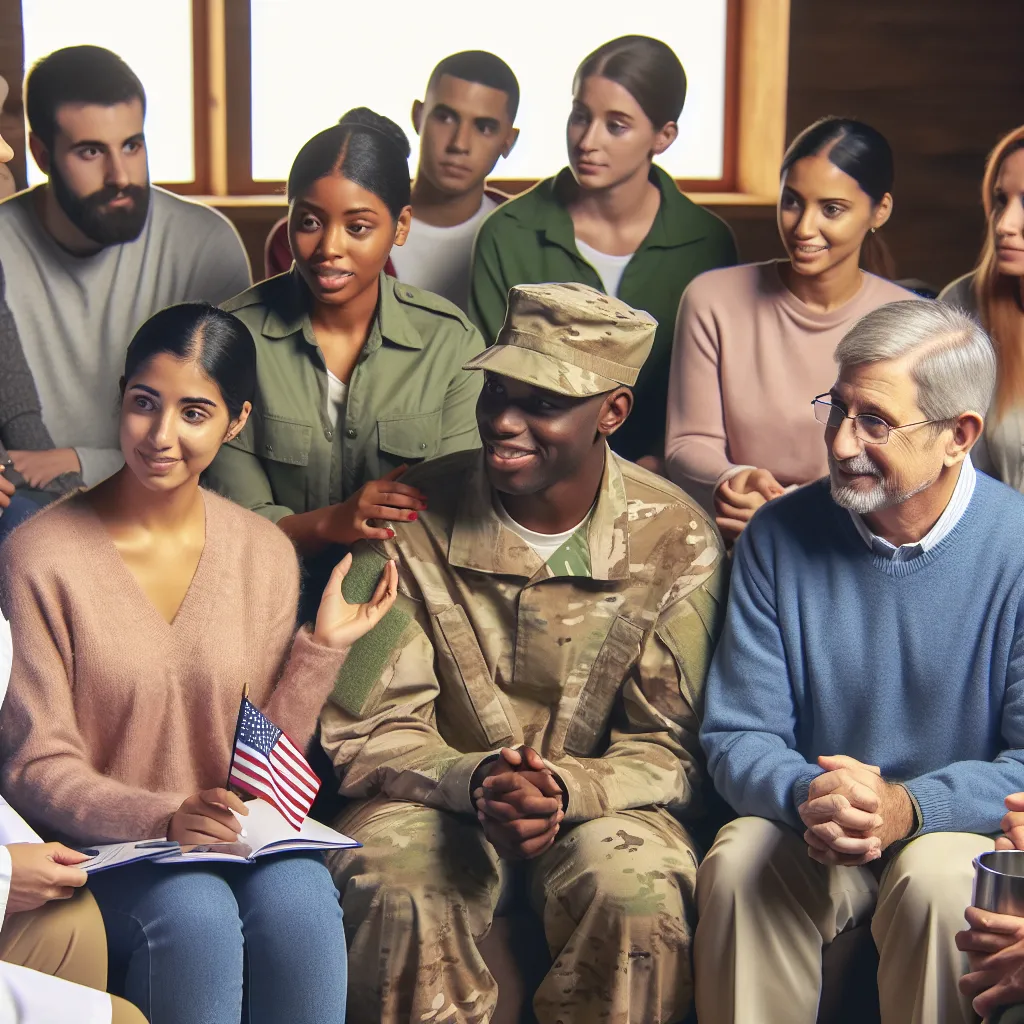The topic of addressing mental health challenges for veterans is becoming increasingly relevant in IELTS Writing Task 2. Based on trends in recent exams and societal focus, this theme is likely to appear more frequently in future tests. Let’s examine a sample question and provide model essays to help you prepare effectively.
 Veterans Mental Health Support
Veterans Mental Health Support
Analyzing the Question
Let’s consider this IELTS Writing Task 2 question:
Many veterans face significant mental health challenges after returning from active duty. What measures should be taken to address these issues, and whose responsibility is it to implement these measures?
This question requires you to:
- Discuss measures to address veterans’ mental health challenges
- Determine who should be responsible for implementing these measures
Remember to fully address both parts of the question in your response.
Sample Essay 1 (Band 8-9)
The mental well-being of veterans is a critical issue that demands immediate attention and comprehensive solutions. This essay will explore various measures to address the mental health challenges faced by veterans and discuss the responsibilities of different stakeholders in implementing these measures.
Firstly, increasing access to specialized mental health services is paramount. This can be achieved by establishing dedicated mental health clinics for veterans within existing healthcare systems. These clinics should be staffed by professionals trained in treating combat-related mental health issues such as post-traumatic stress disorder (PTSD), depression, and anxiety. Additionally, implementing telemedicine options can help reach veterans in remote areas or those who face mobility challenges.
Another crucial measure is to enhance community support networks. Creating peer support groups led by fellow veterans can provide a safe space for individuals to share their experiences and coping strategies. Furthermore, community awareness programs can help reduce stigma surrounding mental health issues and encourage veterans to seek help when needed.
Implementing comprehensive transition programs is also essential. These programs should begin before veterans leave active duty and continue well into their civilian life, offering guidance on job placement, financial management, and social reintegration. Such holistic support can significantly reduce the stress and anxiety associated with transitioning to civilian life.
Regarding responsibility, a multi-faceted approach involving various stakeholders is necessary. The government, particularly the Department of Veterans Affairs, should take the lead in funding and coordinating these initiatives. They should work closely with healthcare providers to ensure that specialized services are available and accessible.
Healthcare institutions and mental health professionals have a responsibility to develop and deliver targeted treatment programs for veterans. This includes ongoing training to stay updated on the latest research and treatment methods for combat-related mental health issues.
Local communities and non-profit organizations also play a crucial role. They can organize support groups, run awareness campaigns, and provide volunteer services to assist veterans in their daily lives.
Lastly, society as a whole bears a responsibility to create a supportive environment for veterans. This includes employers offering job opportunities and accommodations, and the general public showing understanding and respect for the challenges veterans face.
In conclusion, addressing the mental health challenges of veterans requires a comprehensive approach involving specialized healthcare services, community support, and transition programs. While the government should lead these efforts, the responsibility extends to healthcare providers, local communities, and society at large. By working together, we can ensure that those who have served their country receive the support and care they deserve.
(Word count: 395)
Sample Essay 2 (Band 6-7)
Many veterans face mental health problems when they return from duty. This essay will discuss some ways to help them and who should be responsible for these actions.
One important measure is to provide more mental health services for veterans. This could include setting up special clinics where veterans can get help for problems like PTSD and depression. These clinics should have doctors who understand the specific issues that veterans face. It’s also a good idea to offer online counseling services for veterans who live far from clinics or find it hard to travel.
Another helpful measure is to create support groups for veterans. These groups can be led by other veterans who have gone through similar experiences. This can help veterans feel less alone and give them a chance to talk about their problems with people who understand.
It’s also important to help veterans adjust to civilian life. This could include programs that help them find jobs, manage their money, and connect with their communities. These programs should start before veterans leave the military and continue after they return home.
As for who should be responsible, I think it should be a team effort. The government, especially the Department of Veterans Affairs, should take the main responsibility. They should provide funding and organize the services that veterans need.
Hospitals and mental health professionals also have a role to play. They need to make sure they have the right training to help veterans with their specific mental health issues.
Local communities can help too. They can organize support groups and make veterans feel welcome. Employers can also help by offering jobs to veterans and understanding their needs.
In conclusion, helping veterans with their mental health involves providing specialized healthcare, support groups, and programs to help them adjust to civilian life. While the government should lead these efforts, healthcare providers, communities, and employers all have a part to play in supporting our veterans.
(Word count: 309)
Key Points to Remember When Writing
-
Address all parts of the question: Ensure you discuss both the measures to address mental health challenges and who should be responsible.
-
Use specific examples: For higher band scores, provide concrete examples of measures and stakeholders.
-
Develop your ideas: Explain why certain measures are effective or why specific groups should be responsible.
-
Use appropriate vocabulary: Incorporate relevant mental health and veterans’ affairs terminology.
-
Maintain coherence: Use linking words and phrases to connect your ideas smoothly.
-
Vary your sentence structures: Use a mix of simple, compound, and complex sentences for a higher band score.
Vocabulary to Remember
-
Post-traumatic stress disorder (PTSD) (noun) /ˌpəʊst trɔːˈmætɪk stres dɪsˈɔːdə(r)/: A mental health condition triggered by experiencing or witnessing a terrifying event.
-
Reintegration (noun) /riːˌɪntɪˈɡreɪʃn/: The process of rejoining or re-adapting to society.
-
Stigma (noun) /ˈstɪɡmə/: A mark of disgrace associated with a particular circumstance, quality, or person.
-
Holistic (adjective) /həˈlɪstɪk/: Characterized by the treatment of the whole person, taking into account mental and social factors, rather than just the symptoms of a disease.
-
Telemedicine (noun) /ˌtelɪˈmedɪsn/: The remote diagnosis and treatment of patients by means of telecommunications technology.
-
Transition (noun) /trænˈzɪʃn/: The process or period of changing from one state or condition to another.
-
Peer support (noun) /pɪə səˈpɔːt/: Emotional and practical support between people who share a common experience or background.
-
Civilian life (noun phrase) /sɪˈvɪliən laɪf/: The life of a person who is not a member of the armed forces or police.
In conclusion, addressing the mental health challenges of veterans is a complex issue that requires a multifaceted approach. By understanding the key components of this topic and practicing with sample essays, you can improve your ability to write effectively about this and similar subjects in the IELTS Writing Task 2. Remember to analyze the question carefully, structure your essay logically, and use relevant vocabulary and examples to support your arguments.
For further practice, try writing your own essay on this topic or related themes such as how to improve access to mental health care or how to support mental health for veterans. Feel free to share your practice essays in the comments section for feedback and discussion.


